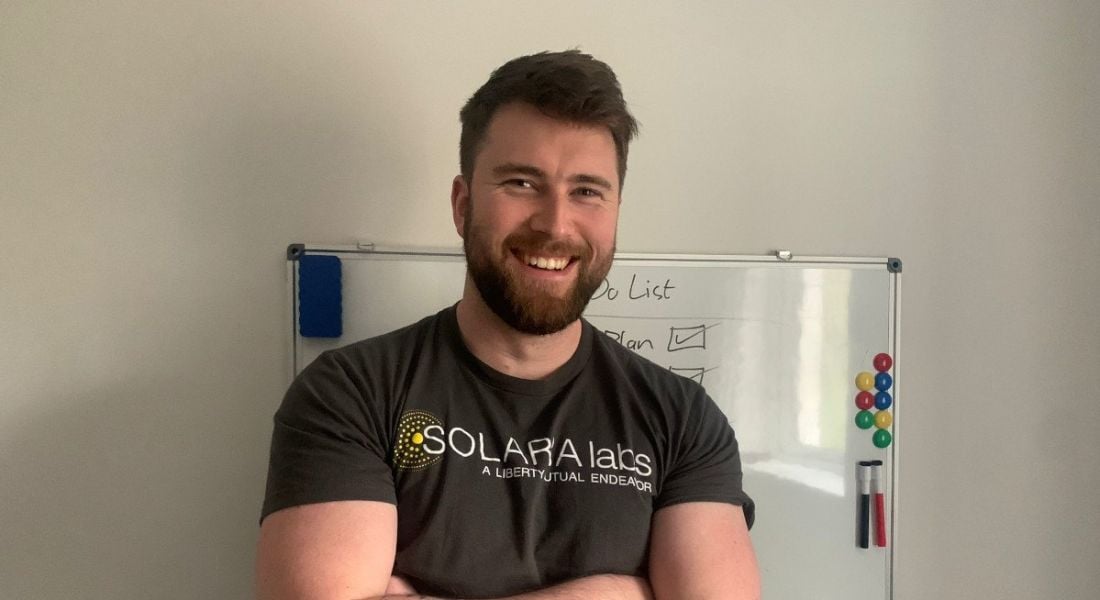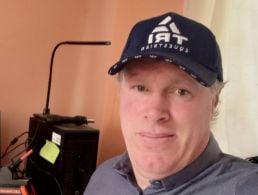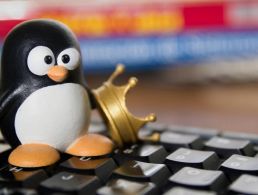Liberty IT’s Alan Quigley talks to SiliconRepublic.com about his role as a software engineer and the benefits of autonomy and exercise to his position.
Alan Quigley says that his day-to-day at Liberty IT is split into two halves – before his US colleagues come online and after.
Quigley is a principal software engineer working in the Incubator innovation department at Liberty IT. As part of his role, he operates as a tech lead of a team working with the company’s business partners in Boston.
According to Quigley, his mornings typically start with a stand-up, where the team help each other with issues, then he focuses on feature work.
Once his US colleagues come online, he transitions into meetings, along with planning and researching future work.
“I find this split in my day very beneficial as I have set focus times for different areas and can easily plan my day accordingly based on what work is in flight and what we have coming down the pipeline.”
‘Communication skills are very important to how I work’
What types of projects do you work on?
I work in an innovation lab under the Liberty Mutual umbrella. Being in this space has afforded me the opportunity to work on a wide range of technologies. I got to work on a cross-platform mobile app built using Google’s Flutter framework and I’m now working on a cloud native React application, Strapi CMS (content management system) and integration with AI models.
The beauty of the space is that we get to work on multiple different offerings for our customers. We have partnerships with companies for delivering smart devices to our customers to help detect electrical arcing in the home, and integrations with our internal data science teams to leverage their machine learning models for our usage.
There is always new and interesting work coming down the pipeline for us and since it is an innovation space, we can contribute to the ideas pool too. We regularly have hackathons in this space, which is fantastic!
What skills do you use on a daily basis?
Given my position, I get to use a wide range of both technical and interpersonal skills on a daily basis.
On the technology side, I work predominantly with React, Typescript, AWS and GraphQL. Skills with these technologies are very important – being able to write clean, maintainable and easily testable code, and understanding the best practices for each and the patterns we can leverage in our projects.
Outside of the core technologies, I require skill in using JIRA – our issue-tracking software of choice – as well as Confluence for documentation.
Interpersonally, my communication skills are very important to how I work. We are globally distributed, operating across time zones so communication is key to success. This also feeds into collaboration skills and emotional intelligence.
We have three groups in our space: Product, Design and Engineering, each of which have different goals and ideas of what is most important. Having empathy for the other groups and understanding their goals and frustrations is key to effective collaboration and delivery.
What is the hardest part of your working day?
The hardest part for me would be disconnecting after work. I live in Athlone and am a remote worker, so aside from when I go into our new Galway hub, I am never far from my home office and work laptop. Couple that with the time-zone difference and knowing my US colleagues will still be on so I have this internal desire to keep working and be productive since I can still collaborate with them until late.
Thankfully, I have taken actions to mitigate this, shutting everything down at the end of the day and keeping my home office door closed has helped. Hobbies are particularly important too, be it exercise, gardening or playing games with my friends. It is vital to disconnect physically but also mentally from work every day.
Do you have any productivity tips that help you through the working day?
For me personally, the greatest gain to my productivity wasn’t a tool or technology. It was simply getting up early and getting some form of exercise done before work. This can be a simple walk, more intense cardio or a full weight training session.
Your mood improves after exercise, and I have found it easier to attain the elusive ‘flow state’ on days when I have exercised. When you split your day between developing and communicating with colleagues, good mood and good focus make all the difference to your productivity. Getting a whiteboard was also pretty good.
When you first started this job, what were you most surprised to learn was important in the role?
The level of negotiation needed was a bit surprising. We operate with a focus on speed to market so compromises need to be met. Design wants a lovely animation added to a certain feature within the app? That’s great, but does it provide as much value as this feature here? We can only get to one or the other this sprint.
Lots of little negotiations need to be made, finding a balance is hard as I have a natural bias towards the engineering side of things and it’s about distancing myself and being able to see the bigger picture.
We all want what is best for our specific fields, but life is about give and take and that is no different here.
How has this role changed as this sector has grown and evolved?
I have been in a software engineering role with Liberty IT for the better part of five years. I joined as an associate and I am currently a principal. In that time, I have noticed the change of scope for a full-stack engineer. The role has evolved and has a wide scope where, with the more widespread adoption of easy-to-set-up cloud infrastructure, DevOps has become an integral part of the role.
As it becomes easier and easier to create infrastructure and code through the use of tools (generative AI being one of the latest), the required skillset of an engineer is expected to broaden to match this. That said, there should always be space for specialist skillsets so having someone who is an expert with cloud technology (AWS, GCP, Azure etc) or someone who is an expert on front-end frameworks (React, Angular, Vue etc) is very important too.
What do you enjoy most about the job?
There are two main reasons why I enjoy my job. The first of which is the autonomy afforded to us as engineers here at Liberty IT. Teams are able to make the decisions that are right for them and their team regarding their technical solutions. If your team of engineers is more proficient in Angular than in React, then by all means develop using Angular as your front-end framework.
It’s not open season by any means in terms of the autonomy, we have to have guardrails in place to ensure our alignment within the enterprise-level architectural strategy, but within those boundaries you are free to make the decisions you deem fit, which is brilliant.
Secondly, and this is a more personal reason, is the fact that we are a vast and globally diverse organisation. This has allowed me to interact with people from all over the world, from Thailand to Colombia. As someone who has a fondness for learning new languages and learning about other cultures, I have to say it has been incredible working here!
10 things you need to know direct to your inbox every weekday. Sign up for the Daily Brief, Silicon Republic’s digest of essential sci-tech news.







